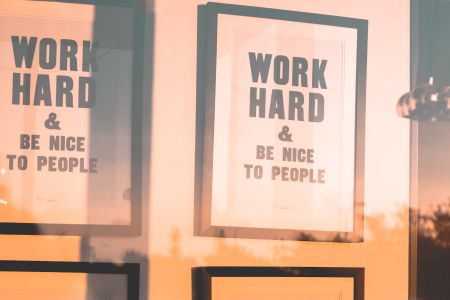Grit: The Power of Passion ❤️🔥 Persistence
Angela Duckworth's Grit is a book about the difference in mind-set for those whose succeed — or not. Is success based on talent or is it based on effort? Her measurement formula finds effort twice as important as talent. And grit — the sustained application of effort towards long-term goals — is the best predictor of achievement.
For those who have listened to the If Books Could Kill evisceration of Outliers, the front and centre cover endorsement by Malcolm Gladwell … ‘fascinating and persuasive’ … is concerning. However, the book is well-written in a conversational without dumbing-down or patronising style. Duckworth is an excellent (if not over qualified) communicator.
An issue for inspirational self-help books though, is that they ultimately can read as extrapolated blog posts rehashing obvious truisms like ‘positive mindset = productive life’ … but that does not mean it's not worth understanding this author's message. Again, Duckworth's no dummy 😮 and most of her findings appear subject to scientific method.
The book begins (and continues) anecdotally. The initial scene is set in the military school West Point's ‘Beast’ where mental toughness is something to be valued and an indicator of success. Given the catastrophic failures (Korea, Indochina, Middle East ad infinitum.) of the hu-ah mindset however, this isn't the best example out there. More applicable is the discussion of ‘money men’ taking enormous financial risks (usually, with the money of others) while still sleeping soundly — so-called ‘winners’ 🥇 who hate losing …
Yet even some of these ‘successful’ people fail when faced with adversity and the author considers direction as important as determination — grit comes with passion and perseverance and not with innate ‘talent’. So, the spelling bee winners do more comps and study longer — they have more grit.

Like other of the author's ‘paragons of grit‘ presented throughout the book, the racist scientist Charles ‘dickhead’ Darwin as a positive example is problematic. But, because Darwin was a piece of shit as a human being, it's probably correct to say his self-diagnosed zeal and hard work got him farther than his actual intellect.
Duckworth references examples from her financial consultancy work experience where aggressive culling of the least talented staff from firms (rank and yank) saw the rise of the Enrons of the world via short-term performance being aggressively valued over long-term learning and growth. She understand and acknowledges this but, then, is impressed by Jeff Bezos? 🤷♀️
Duckworth also discusses the societal tendency to label others as ‘naturals’ — effectively excusing the majority of us from even trying. Friedrich Nietzsche said the ‘cult of the genius’ allows us to never compete with the ‘gifted’ — why bother? We are not lacking because they are magical! 🦄 Talent and achievement are equated so there is no need for effort! 🎉 You have no chance!
Accomplishment is possible by those who think actively in a focussed direction — high performance can simply be the ‘accretion of mundane acts’.
Exemplars are crafts
menpeople. Friederich Nietzsche.

The author defines theory as an explanation — where facts and observations are explained and achievement occurs when (acquired) skills are used. While she notes that outside forces (coaches, parents, 💰 etc.) are also involved — overall, sustained effort builds skill and makes it productive …
talent * effort = skillskill * effort = achievement
Doing one thing better and better may well be better than doing many things amateurishly and Duckworth includes Woody ‘Step Kid’ Allen and Will ‘Biatch Slap’ Smith as prime examples of committed focus. But, again, these are not the most impressive people 🤨 so readers could be forgiven thinking that grit is a common trait among successful dogrooters! 🤯 🤣
Those with twice the talent but working half as hard may reach a similar skill level but produce less because those who strive and improve skill and production (quality and quantity) over time achieve more. Without effort, skill is just unmet potential.

Regardless, farting and/or skipping around in life is not what successful/productive people do. There is no shortcut to excellence — it is time that builds expertise and passion is about consistency over time. So …
A life philosophy based around these attributes gives direction to lower-level goals — only doing the things that help towards the goal and it takes grit to hold that goal for a long time. Low/mid-level goals therefore support the main goal. Without the top-level goal those other goals can be disconnected (and you can drop low-level goals when no longer useful).
Duckworth makes the case that both genes and experience affect psychological traits relevant to success — there is no single grit gene. But the argument gets a little fuzzy (for us!) with qualitative speculation about generational grit scale differences — those pesky millennials!
More concrete is her contrasting of dropouts with gritty people who have interest and practice with daily discipline — doing and improving with purpose (for self and others) amid hope that they will improve — not losers like us who just give up! 😳
Part Two of the book isn't as good as the first. Again, calling a cunt like Jeff fucking Bezos an achiever idolises good ol' merican values lauding rich cunts as positively passionate — not just financially literate — making billions by exploiting people, resources and avoiding tax — never sits well.

This section's hard-working immigrant and ‘doing what you love’ anecdotes are also more trope-like than helpful because doing what you love is a fucking luxury — most people do not get to love what they do for a living. But Bezos loves making money — lots of fucking 🤑 money. While it's true most people do better when engaged in something they're interested in, Bezos et al., exploit those stuck in jobs no-one could be interested in.
Saying ‘no one works doggedly on something they don’t find intrinsically interesting’ isn't even wrong unless you believe first-world problems are real-world problems. So, calling Jeff fucking Bezos a ‘terrific inspiration’ for what work can be could only be inoffensive for greedy and stupid people — happiness and success are not the same fucking thing.
What is good advice is to foster a passion because many people don't have one. The author also reminds us that romantic notions of love are unrealistic — it's hard work people! Passion for work is about discovery then development then (a lifetime of) deepening skill, knowledge etc. And, parental support can help kids achieve competency and direction.
Staying in love is the goal 🥰 not just falling in love … Unsurprisingly, we scored less than
2on the grit score! 🥲

Interaction not introspection is key to discovery. The Latin interesse is being different — being interested — because boredom is being neutral about life. As the author says … Fostering passion over time is the nuance of a true aficionado.
But is grit simply more time on a task? The Japanese concept of kaizen is ‘continuous improvement’ with no plateau of arrested development tf you look forward to growth — thousands of hours over many years as deliberate practice — striving to improve specific weaknesses. Then, when fixed, finding the next weakness to strive on/over like slave-holder Ben Franklin's essay practice — reading and then rewriting Spectator articles.
Or, you could translate some poetry into prose and vice versa. Duckworth also describes how experts do more and feel better …
Deliberate practice is preparation while flow [as in ‘in the flow’ when performing what you've prepared for] is performance.
She also says making deliberate practice a habit or routine is better than just deciding to do it in situ/ad hoc — it becomes an automatic part of your life.

Purpose is seen as the intention to ’contribute to the wellbeing of others’ (definitely excluding Bezos 😯). So the claim that the mature passions of gritty people depend on interest and purpose can be disingenuous and suggesting there's a commonality with hard-working cancer survivors and self-aggrandising captains of industry is obscene as many paragons of grit (again, Bezos et al.) do not belong with the words ‘moral imperative!’
Again, this is the least effective section of the book and the supporting data is increasingly qualitative …
The chapter on Hope explores actions improving what comes tomorrow as a corner stone to grit and this is backed up by a hideous 1960s experiment torturing dogs — offered as supporting evidence of the effects of this optimistic outlook — improved sales by believers of up to 40% are compared to pessimist losers. 'mericans and money 😉 … never one without the other!
More truisms follow … setbacks can and do derail people and having grit helps them get through it. The so-called growth mindset of optimists is common among winners 🏆 as is grit. Effort should be the basis of praise or not and do not keep telling kids they're naturals — support their learning and learning to improve, instead.
At the book's 66% mark, here are a few other take aways …
IQ scores are not fixed over a persons lifetime. Treat the brain like a muscle — improving with exercise.
No idea who Kelly Clarkson is but Kanye's 'nother dickhead proffered as a paragon of grit.
Optimistic self-talk can help defeat learnt helplessness and cognitive therapists can help improving with resilience training.
- If nothing else, ask for help.
- You can change the way you think, feel and behave.
- Torturing rats or any animals to support conjecture isn't good.
- Poverty is not good for anyone's self esteem.

Our kids died before being born so there's no need to look at the Parenting for Grit chapter. But, it turns out, Nietzsche's ‘What doesn't kill you makes you stronger’ mantra is wrong because, in fact, it's the finding a way out — the avoiding — of the suffering that does the actual strengthening.
Increased participation leads to better life outcomes and the research/anecdotes support this well. Especially when you consider US kids average three hours per day in front of a screen — a stat that explains so much about that place. It's the long-term (> one year) extracurricular activities that drive success in life — continuous and purposeful involvement and improvement.
This good work is partially undone however by the introduction of Bill ‘Grey Man’ Gates — friend of Jeffrey ‘Under Age’ Epstein.
I’ve known Jeff for 15 years. Terrific guy. He’s a lot of fun to be with. It is even said that he likes beautiful women as much as I do, and many of them are on the younger side. DJ Trump, New York magazine, 2002.
Anyway, we digress as they say in the classics, Gates is proffered unchallenged as someone to take seriously. But his ex-wife doesn't. And Gates himself wouldn't employ software engineers who didn't finish what they started 🤔 and was an unco cunt …
OK, but the point is that prestigious institutions like Harvard also consider extra curricular criteria when assessing applications.
Another important point is how this participation — or not — affects disadvantaged groups of children i.e., they don't get the same challenging childhood opportunities or support to become involved in such positive experiences — let alone get to develop them over time or generations.
Decent childhoods are what brings about societal change. Industriousness can be learnt because anyone can learn that hard work can bring rewards — but, again, such works needs direction and that's hard to find if you're struggling financially.
The closing chapters return to dubious West Point paragons of grit and while the gridiron anecdotes don't add anything either there are take-aways …
- Joining a good gritty team or culture helps people become better.
- Being a good person is more important than grit or success.
- You don't have to finish everything you start.
Also, nationalism and corporate culture can assist success but, again, that's not the same as being good; and 'merican culture is not sustainable …
Effortless entertainment is the enemy of long-term passion and perseverance. Angela Duckworth, Author.
Grit is a good read but not perhaps not such a great book. It could have been edited/cut considerably (not sure if the author has fully forgiven her father). And perhaps later editions will remove some of the less than honourable ‘paragons of grit’ included (to be fair, some may not have been fully exposed at the time of publication). But, the book's overall message is positive.

NB: A little confusing is the 1st ed. (2016, hardback) title of the book was Grit, The Power of Passion and Perseverance; while the 2017 (paperback) ed. is called Grit, Why passion and resilience are the secrets to success but then, inside the cover, it's called Grit: The Power of Passion and Persistence?
- ↜ Previous: How to Make 👩💻 Anki Flash Cards
- ↝ Next: Antinatalism 😱 Fear & Loathing